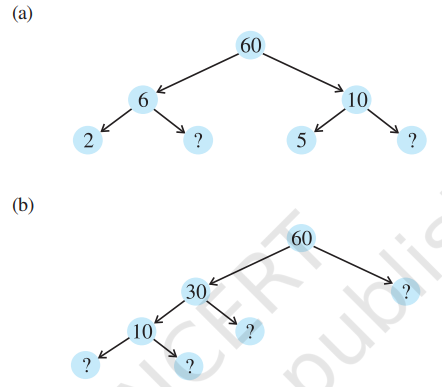Complete Solutions to EXERCISE 3.5 of chapter PLAYING WITH NUMBERS of Class 6 book with complete answers and questions
| Class 6 | MATHS |
| Chapter | PLAYING WITH NUMBERS |
| Mathematics | EXERCISE 3.5 |
| Number Of Questions | 12 |
| Academic Year | 2023-24 |
In which of the following expressions, prime factorisation has been done?(a) 24 = 2 × 3 × 4 (b) 56 = 7 × 2 × 2 × 2(c) 70 = 2 × 5 × 7 (d) 54 = 2 × 3 × 9
00:44View SolutionWhich factors are not included in the prime factorisation of a composite number?
00:37View SolutionHere are two different factor trees for 60. Write the missing numbers.
 02:38View Solution
02:38View SolutionWhich of the following statements are true?(a) If a number is divisible by 3, it must be divisible by 9.(b) If a number is divisible by 9, it must be divisible by 3.(c) A number is divisible by 18, if it is divisible by both 3 and 6.(d) If a number is divisible by 9 and 10 both, then it must be divisible by 90.(e) If two numbers are co-primes, at least one of them must be prime.(f) All numbers which are divisible by 4 must also be divisible by 8.g) All numbers which are divisible by 8 must also be divisible by 4.(h) If a number exactly divides two numbers separately, it must exactly divide their sum.(i) If a number exactly divides the sum of two numbers, it must exactly divide the two numbers separately.
04:51View SolutionThe product of three consecutive numbers is always divisible by 6. Verify this statement with the help of some examples.
04:29View SolutionFind all the prime factors of 1729 and arrange them in ascending order. Now state the relation, if any; between two consecutive prime factors.
02:18View SolutionWrite the smallest 5-digit number and express it in the form of its prime factors.
01:08View SolutionWrite the greatest 4-digit number and express it in terms of its prime factors.
01:00View SolutionThe sum of two consecutive odd numbers is divisible by 4. Verify this statement with the help of some examples.
04:31View Solution18 is divisible by both 2 and 3. It is also divisible by 2 × 3 = 6. Similarly, a number is divisible by both 4 and 6. Can we say that the number must also be divisible by 24? If not, give an example to justify your answer.
04:31View SolutionDetermine if 25110 is divisible by 45.
01:11View SolutionI am the smallest number, having four different prime factors. Can you find me?
00:56View Solution
EXERCISE 3.5 questions and complete solutions for chapter PLAYING WITH NUMBERS of NCERT MATHEMATICS(Hinglish) of Class 6
